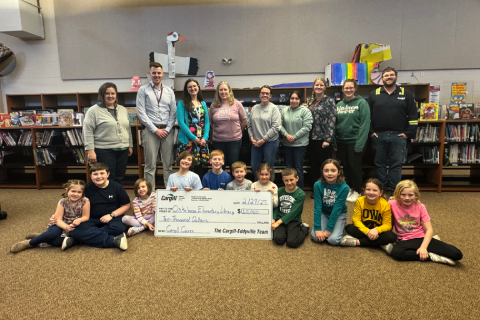OSKALOOSA, Iowa – Students at Oskaloosa Elementary School will soon have access to a refreshed nonfiction book collection, thanks to a $10,000 donation from the Eddyville Cargill Cares program. The grant is being used to purchase high-quality nonfiction books to replace outdated materials, many of which are more than two decades old.
“Our nonfiction collection is our highest circulating section,” said Elizabeth Good, Oskaloosa Elementary School librarian. “Kids love nonfiction. They are drawn to the pictures and the information—they want to learn more. But unfortunately, our nonfiction books are as old as our second-year teachers. Our kids deserve the very best, and we are working to make that happen.”
Good is been advocating for library updates since she arrived in 2017, when the average age of the library’s entire collection was 1995. She quickly realized the extent of the problem when a fifth-grade student approached her for a book about Germany. The first book they pulled from the shelf was about West Germany—a country that hasn’t existed since 1990.
“That was the moment I knew we had a lot of work to do,” Good said. “We had books with outdated or even incorrect information.”
Since then, Good has undertaken extensive weeding of the library’s collection to remove books that no longer serve students and replacing with books that fit the needs of today’s students.
“Nonfiction books are significantly more expensive than fiction,” Good said. “A high-quality nonfiction book runs between $25 and $30, compared to $15 to $20 for fiction. Because of the cost, nonfiction isn’t replaced as quickly, which is why our collection has become so outdated.”
The Cargill donation provides approximately 450 new books, bringing the library closer to the recommended standard of 15 books per student. The selection will focus on STEM topics such as robotics, coding, and engineering—subjects that align with modern learning and workforce development needs.
“Purchasing decisions were made with the future in mind,” Good said. “We are investing in books that will engage students in science, technology, and innovation—areas that will prepare them for careers, including those right here in our community.”
Each year, the American Association of School Librarians recommends adding 400 new books to an elementary library’s collection. With current funding sources—including grants, book fair proceeds and community donations—Good has been able to add materials gradually.
“This donation is a game changer,” she said. “But maintaining a high-quality collection requires ongoing investment. We can’t stop here.”
Good has a five-year plan to continue improving the collection. She works closely with book vendors to analyze collection gaps and prioritize purchases based on data.
“Right now, 67% of our books are considered aged, meaning they are too old to be useful or relevant,” she said. “We are working to bring that number down while ensuring that we have enough books to meet student demand.”
As for Cargill, Good expressed deep gratitude for their support.
“They are funding the next generation of leaders and employees,” she said. “This investment comes full circle. This donation is helping to keep kids engaged, learning, and connected to their community.”




